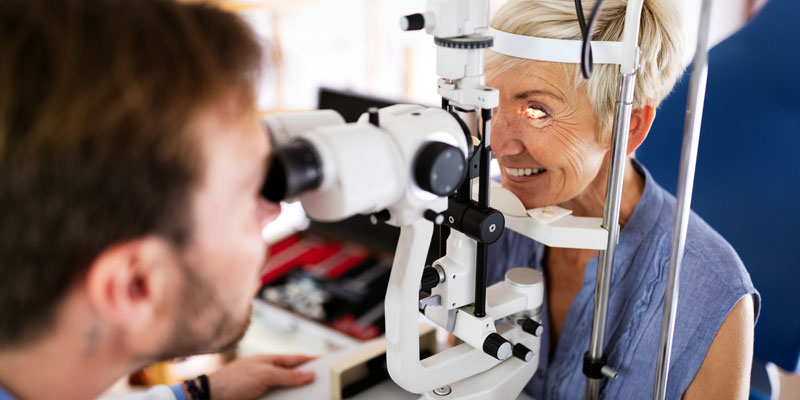
As we age, our eyes go through changes that can impact our vision and overall eye health. However, you can take steps to maintain healthy vision and protect your eyes.
May is Healthy Vision Month, and San Jacinto College’s Debra Clarke, eye care technology program director, offers helpful tips to maintaining healthy eyesight.
The most common eye conditions that increase with aging are cataracts, age-related macular degeneration, glaucoma, and diabetic retinopathy.
Cataracts, a clouding of the eye’s normally clear lens, make it seem as if you are looking through a frosty or fogged-up window. Cataracts affect most people as our eyes age, and surgery is required to correct the issue.
Age-related macular degeneration affects the central vision. Although it doesn’t cause complete blindness, it can make it harder to perform everyday tasks. Depending on the stage and type of the condition, you may pursue different treatments. Your doctor could prescribe medication or perform injections in your eye.
Glaucoma, a group of eye diseases, causes vision loss and blindness by damaging the optic nerve. Many people don’t have any symptoms until they start to lose their vision, and people may not notice vision loss right away. Treatment options include prescription eye drops, oral medicines, laser treatment, surgery, or a combination of approaches.
Diabetic retinopathy is caused by diabetes and affects the retina. Mild cases may be treated with careful diabetes management, while advanced cases may require laser treatment or surgery.
What can you do to help prevent these conditions?
Get regular eye exams One of the most important things you can do to protect your eyes is to get regular eye exams with an ophthalmologist. Even if you haven’t noticed any changes in your vision, it’s important to get a comprehensive eye exam at least once every two years or once a year for those with diabetes.
Many eye conditions develop slowly and may not cause noticeable symptoms until they have already progressed significantly.
“Consistent eye exams can tell us a lot about not only the health of your eyes but other areas as well,” Clarke said. “The eyes are the windows to the body. We can see signs of high blood pressure, heart disease, diabetes, and more.”
Lifestyle changes Smoking and drinking alcohol can damage eye health and increase the risk of cataracts, macular degeneration, and other eye conditions. If you smoke, you should consider quitting as soon as possible to protect your eyes and overall health.
“Smokers are three to four times more likely to develop age-related macular degeneration than nonsmokers,” Clarke said. “It can also increase the likelihood of early onset cataracts, glaucoma, and diabetic retinopathy.”
Stay active Physical activity can boost eye health. Exercise can improve blood flow to the eyes, which helps prevent age-related macular degeneration. You should aim to get at least 30 minutes of moderate exercise most days of the week.
Don’t be afraid of surgery According to Clarke, “Medical technology for surgery has developed a lot in the last 10 years.”
Cataracts surgery used to take months of recovery. Now, the surgery lasts about one hour and is almost painless.
With these tips, you can help prevent age-related eye conditions and enjoy good vision well into your golden years.
By Melissa Trevizo


